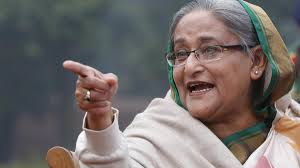Can Sheikh Hasina be Extradited?

- 19 Sep 2024
In News:
The chief prosecutor of Bangladesh’s International Crimes Tribunal (ICT), Mohammad Tajul Islam, announced plans to seek the extradition of former Prime Minister Sheikh Hasina from India. The ICT was established in 2010 to investigate crimes committed during the 1971 independence war from Pakistan.
Background on Sheikh Hasina's Exile
Ms. Hasina sought refuge in India in early August after a mass uprising forced her to resign. Following her departure, numerous criminal cases have been filed against her and her aides, with charges including murder, torture, abduction, crimes against humanity, and genocide. The interim government in Dhaka has revoked her diplomatic passport, and the existing bilateral extradition treaty between India and Bangladesh may allow for her return to face trial.
Extradition Treaty Overview
Key Provisions
- Under the International Crimes (Tribunals) Act of 1973, Bangladeshi courts can proceed with trials in Ms. Hasina’s absence, raising concerns about the fairness and adherence to due process. Thus, her extradition is deemed crucial.
- The extradition treaty between India and Bangladesh was executed in 2013 and amended in 2016 to facilitate the exchange of fugitives. The treaty has allowed the transfer of several political prisoners, including two involved in the 1975 assassination of Sheikh Mujibur Rahman, Ms. Hasina’s father, and Anup Chetia, the former general secretary of the banned United Liberation Front of Assam (ULFA).
Extradition Conditions
- The treaty mandates the extradition of individuals charged with crimes punishable by at least one year’s imprisonment. It follows the principle of dual criminality, meaning the offense must be punishable in both countries. Since the charges against Ms. Hasina are prosecutable in India, she qualifies for extradition. The treaty also covers attempts to commit crimes and complicity in such offenses.
- The 2016 amendment significantly lowered the evidentiary threshold for extradition, requiring only an arrest warrant from a competent court in the requesting country to initiate proceedings.
Grounds for Refusal of Extradition
Political Nature of Offenses
Article 6 of the treaty allows for extradition to be refused if the offense is deemed of a “political nature.” However, many offenses, including murder and terrorism-related crimes, are explicitly excluded from this classification. Given that several charges against Ms. Hasina fall outside this exemption, it is unlikely India could justify denying extradition on these grounds.
Good Faith Clause
Article 8 permits denial of extradition requests if the accusations are not made in good faith or involve military offenses not recognized under general criminal law. India could argue that the charges against Ms. Hasina are politically motivated and may lead to her facing unfair trials or persecution upon her return. Recent reports indicate that some of Ms. Hasina’s former ministers faced violent arrests, raising further concerns about the political climate in Bangladesh.
Potential Implications of Extradition Request
Dr. Sreeradha Datta, a professor of international relations at O.P. Jindal Global University, commented that the treaty does not guarantee Ms. Hasina’s extradition, emphasizing that the final decision will depend on diplomatic negotiations and political factors. Even if India declines the request, it may only serve as a minor political irritant rather than significantly damaging bilateral relations.
Economic Considerations
Bangladesh is India’s largest trade partner in South Asia, with bilateral trade estimated at $15.9 billion for the fiscal year 2022-23. Before Ms. Hasina’s ouster, both countries were set to discuss a comprehensive economic partnership agreement (CEPA) to strengthen economic ties. Following the regime change in Dhaka, Indian Prime Minister Narendra Modi has engaged with Chief Adviser Muhammad Yunus of the interim government, pledging continued support for ongoing development projects.
